Role of CSR in Achieving SDGs: Woolworths and Aldi Analysis
VerifiedAdded on 2023/01/17
|13
|2877
|84
Report
AI Summary
This report delves into the critical role of Corporate Social Responsibility (CSR) in contributing to the achievement of the United Nations' Sustainable Development Goals (SDGs). It meticulously analyzes the sustainability reports published by Woolworths and Aldi, two prominent Australian corporations, evaluating their CSR initiatives within the context of the SDGs. The report examines how these companies align their activities with the 17 global goals, assessing their efforts in areas such as environmental sustainability, social responsibility, and economic growth. The analysis draws upon extensive research, including peer-reviewed studies and reputable financial media sources, to provide a comprehensive and critical evaluation of the information presented in the sustainability reports. The report concludes by assessing the effectiveness of the companies' CSR strategies in promoting sustainable development and contributing to a better future. The report also examines the relationship between CSR and SDGs, highlighting the importance of corporate self-regulation and partnerships in driving sustainable development. The examples of Woolworths and Aldi are used to evaluate the CSR activities and their impact on the achievement of SDGs. The report also includes an introduction, conclusion, and references section.
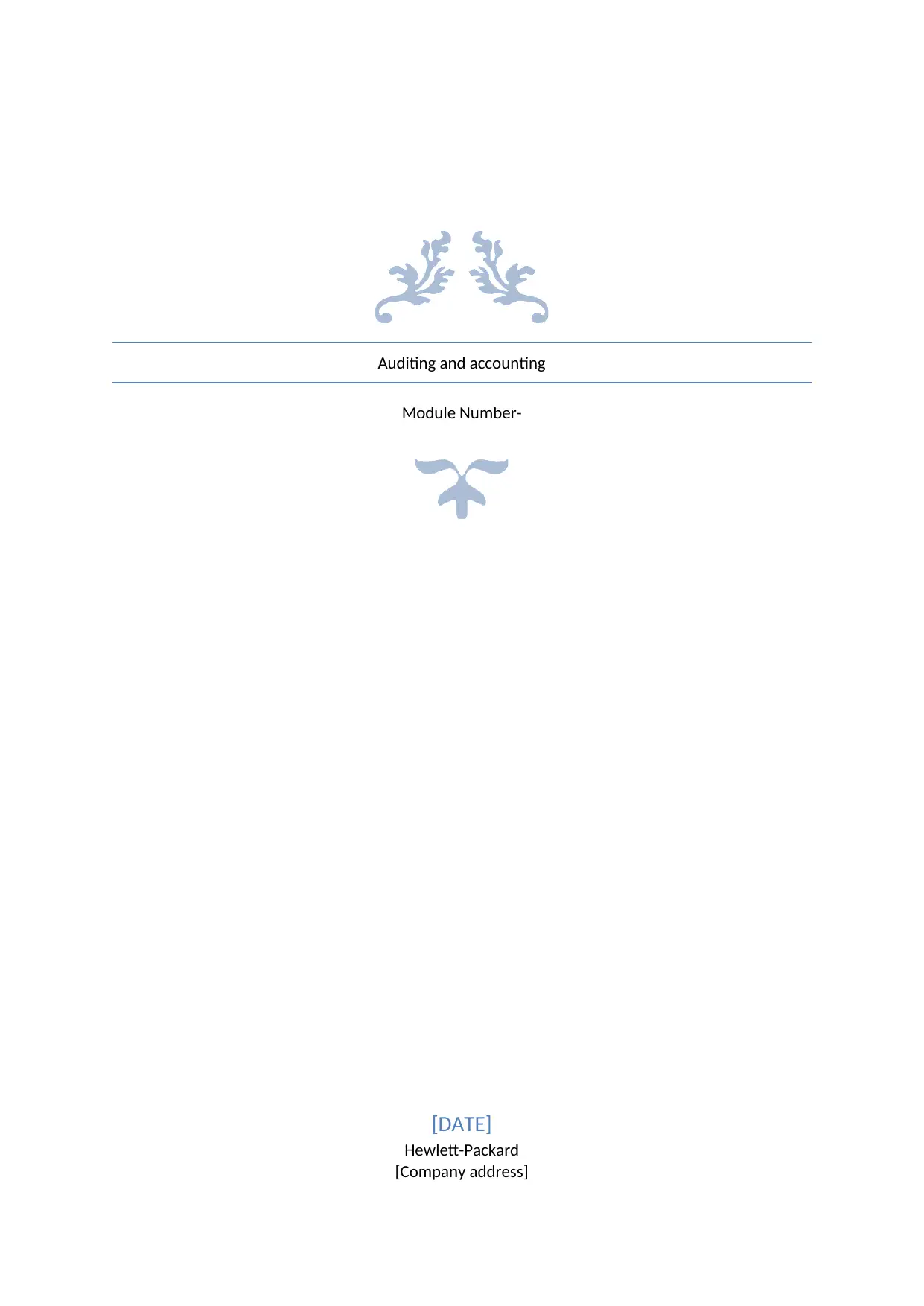
Auditing and accounting
Module Number-
[DATE]
Hewlett-Packard
[Company address]
Module Number-
[DATE]
Hewlett-Packard
[Company address]
Paraphrase This Document
Need a fresh take? Get an instant paraphrase of this document with our AI Paraphraser
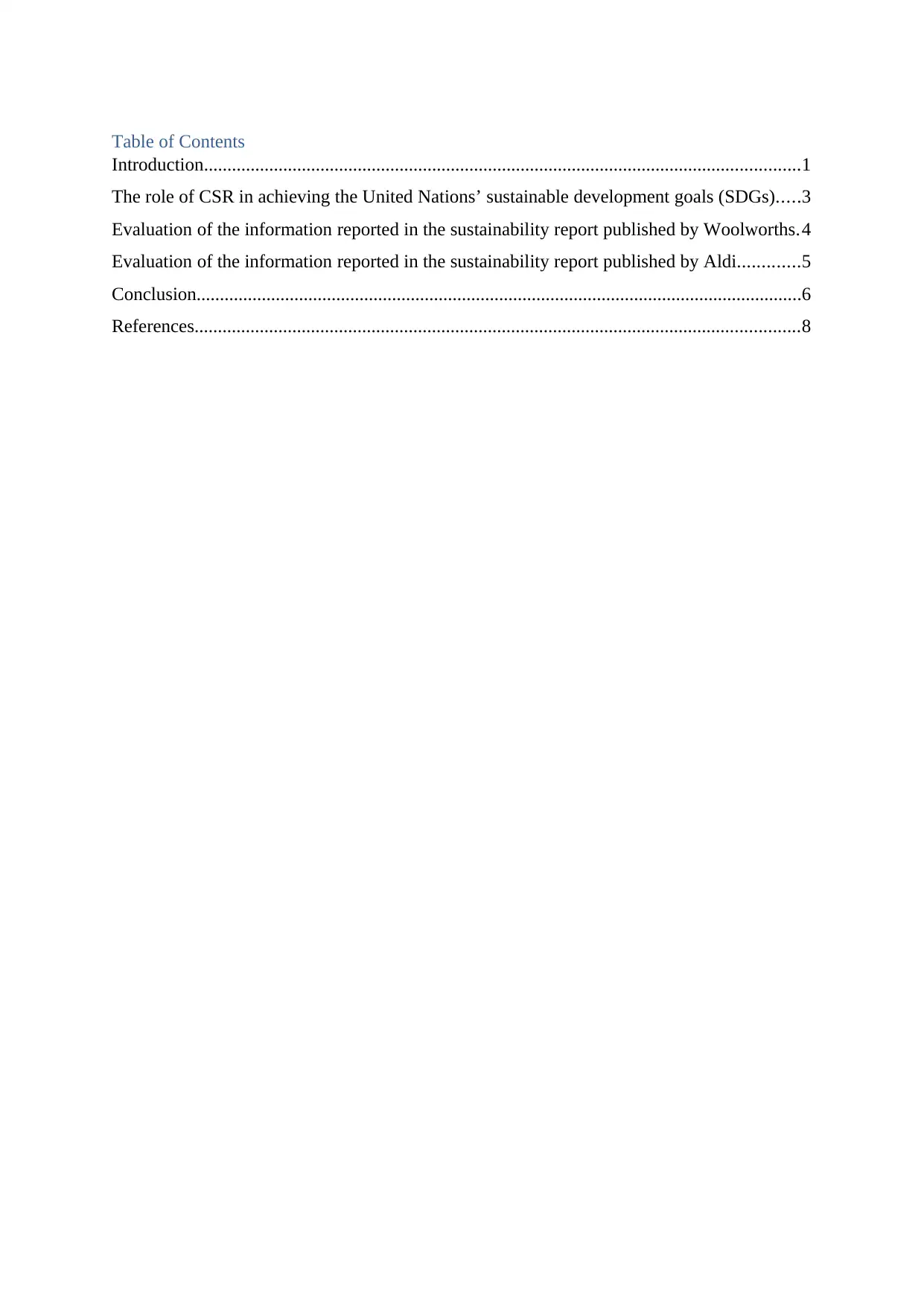
Table of Contents
Introduction................................................................................................................................1
The role of CSR in achieving the United Nations’ sustainable development goals (SDGs).....3
Evaluation of the information reported in the sustainability report published by Woolworths.4
Evaluation of the information reported in the sustainability report published by Aldi.............5
Conclusion..................................................................................................................................6
References..................................................................................................................................8
Introduction................................................................................................................................1
The role of CSR in achieving the United Nations’ sustainable development goals (SDGs).....3
Evaluation of the information reported in the sustainability report published by Woolworths.4
Evaluation of the information reported in the sustainability report published by Aldi.............5
Conclusion..................................................................................................................................6
References..................................................................................................................................8
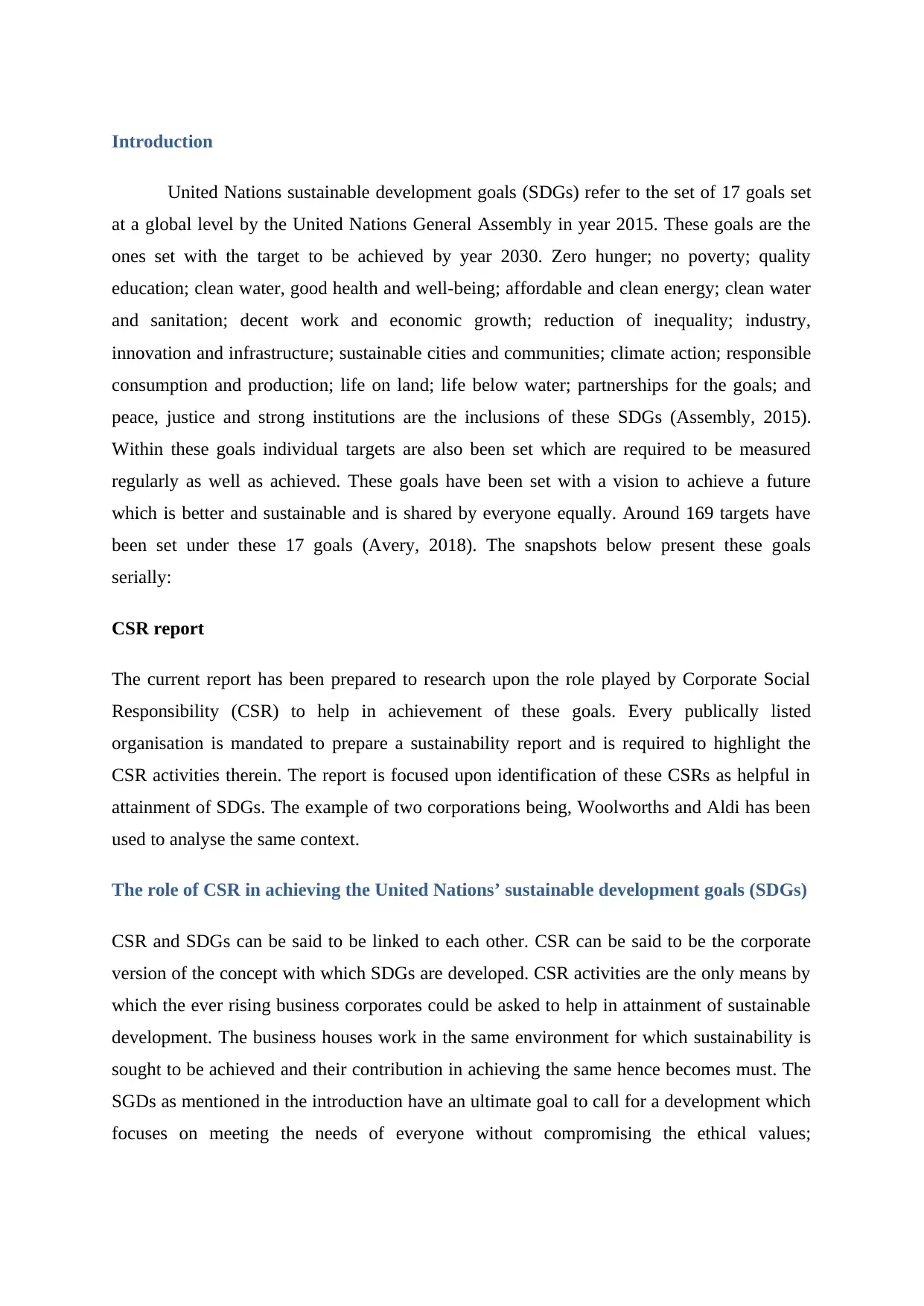
Introduction
United Nations sustainable development goals (SDGs) refer to the set of 17 goals set
at a global level by the United Nations General Assembly in year 2015. These goals are the
ones set with the target to be achieved by year 2030. Zero hunger; no poverty; quality
education; clean water, good health and well-being; affordable and clean energy; clean water
and sanitation; decent work and economic growth; reduction of inequality; industry,
innovation and infrastructure; sustainable cities and communities; climate action; responsible
consumption and production; life on land; life below water; partnerships for the goals; and
peace, justice and strong institutions are the inclusions of these SDGs (Assembly, 2015).
Within these goals individual targets are also been set which are required to be measured
regularly as well as achieved. These goals have been set with a vision to achieve a future
which is better and sustainable and is shared by everyone equally. Around 169 targets have
been set under these 17 goals (Avery, 2018). The snapshots below present these goals
serially:
CSR report
The current report has been prepared to research upon the role played by Corporate Social
Responsibility (CSR) to help in achievement of these goals. Every publically listed
organisation is mandated to prepare a sustainability report and is required to highlight the
CSR activities therein. The report is focused upon identification of these CSRs as helpful in
attainment of SDGs. The example of two corporations being, Woolworths and Aldi has been
used to analyse the same context.
The role of CSR in achieving the United Nations’ sustainable development goals (SDGs)
CSR and SDGs can be said to be linked to each other. CSR can be said to be the corporate
version of the concept with which SDGs are developed. CSR activities are the only means by
which the ever rising business corporates could be asked to help in attainment of sustainable
development. The business houses work in the same environment for which sustainability is
sought to be achieved and their contribution in achieving the same hence becomes must. The
SGDs as mentioned in the introduction have an ultimate goal to call for a development which
focuses on meeting the needs of everyone without compromising the ethical values;
United Nations sustainable development goals (SDGs) refer to the set of 17 goals set
at a global level by the United Nations General Assembly in year 2015. These goals are the
ones set with the target to be achieved by year 2030. Zero hunger; no poverty; quality
education; clean water, good health and well-being; affordable and clean energy; clean water
and sanitation; decent work and economic growth; reduction of inequality; industry,
innovation and infrastructure; sustainable cities and communities; climate action; responsible
consumption and production; life on land; life below water; partnerships for the goals; and
peace, justice and strong institutions are the inclusions of these SDGs (Assembly, 2015).
Within these goals individual targets are also been set which are required to be measured
regularly as well as achieved. These goals have been set with a vision to achieve a future
which is better and sustainable and is shared by everyone equally. Around 169 targets have
been set under these 17 goals (Avery, 2018). The snapshots below present these goals
serially:
CSR report
The current report has been prepared to research upon the role played by Corporate Social
Responsibility (CSR) to help in achievement of these goals. Every publically listed
organisation is mandated to prepare a sustainability report and is required to highlight the
CSR activities therein. The report is focused upon identification of these CSRs as helpful in
attainment of SDGs. The example of two corporations being, Woolworths and Aldi has been
used to analyse the same context.
The role of CSR in achieving the United Nations’ sustainable development goals (SDGs)
CSR and SDGs can be said to be linked to each other. CSR can be said to be the corporate
version of the concept with which SDGs are developed. CSR activities are the only means by
which the ever rising business corporates could be asked to help in attainment of sustainable
development. The business houses work in the same environment for which sustainability is
sought to be achieved and their contribution in achieving the same hence becomes must. The
SGDs as mentioned in the introduction have an ultimate goal to call for a development which
focuses on meeting the needs of everyone without compromising the ethical values;
⊘ This is a preview!⊘
Do you want full access?
Subscribe today to unlock all pages.

Trusted by 1+ million students worldwide
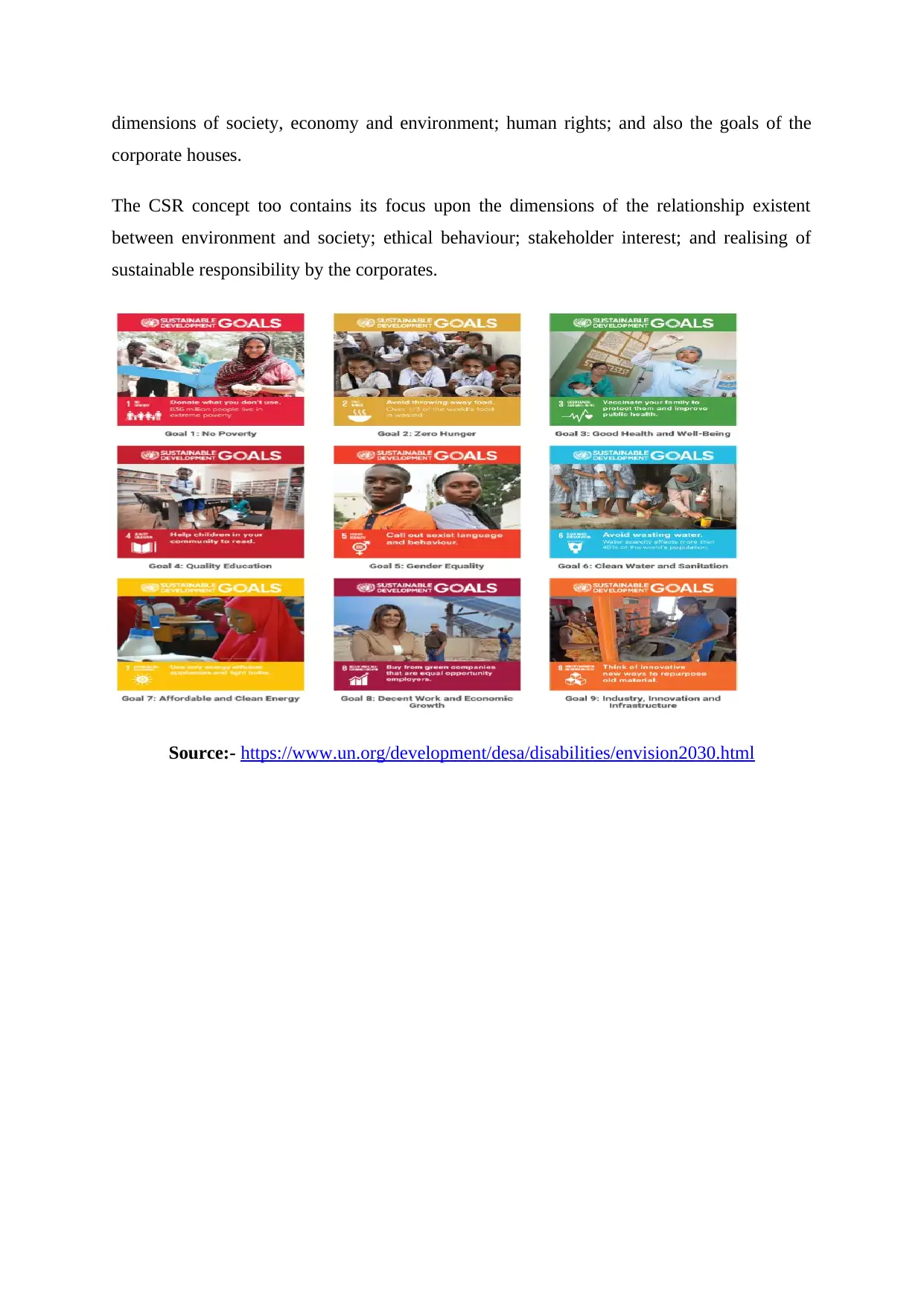
dimensions of society, economy and environment; human rights; and also the goals of the
corporate houses.
The CSR concept too contains its focus upon the dimensions of the relationship existent
between environment and society; ethical behaviour; stakeholder interest; and realising of
sustainable responsibility by the corporates.
Source:- https://www.un.org/development/desa/disabilities/envision2030.html
corporate houses.
The CSR concept too contains its focus upon the dimensions of the relationship existent
between environment and society; ethical behaviour; stakeholder interest; and realising of
sustainable responsibility by the corporates.
Source:- https://www.un.org/development/desa/disabilities/envision2030.html
Paraphrase This Document
Need a fresh take? Get an instant paraphrase of this document with our AI Paraphraser
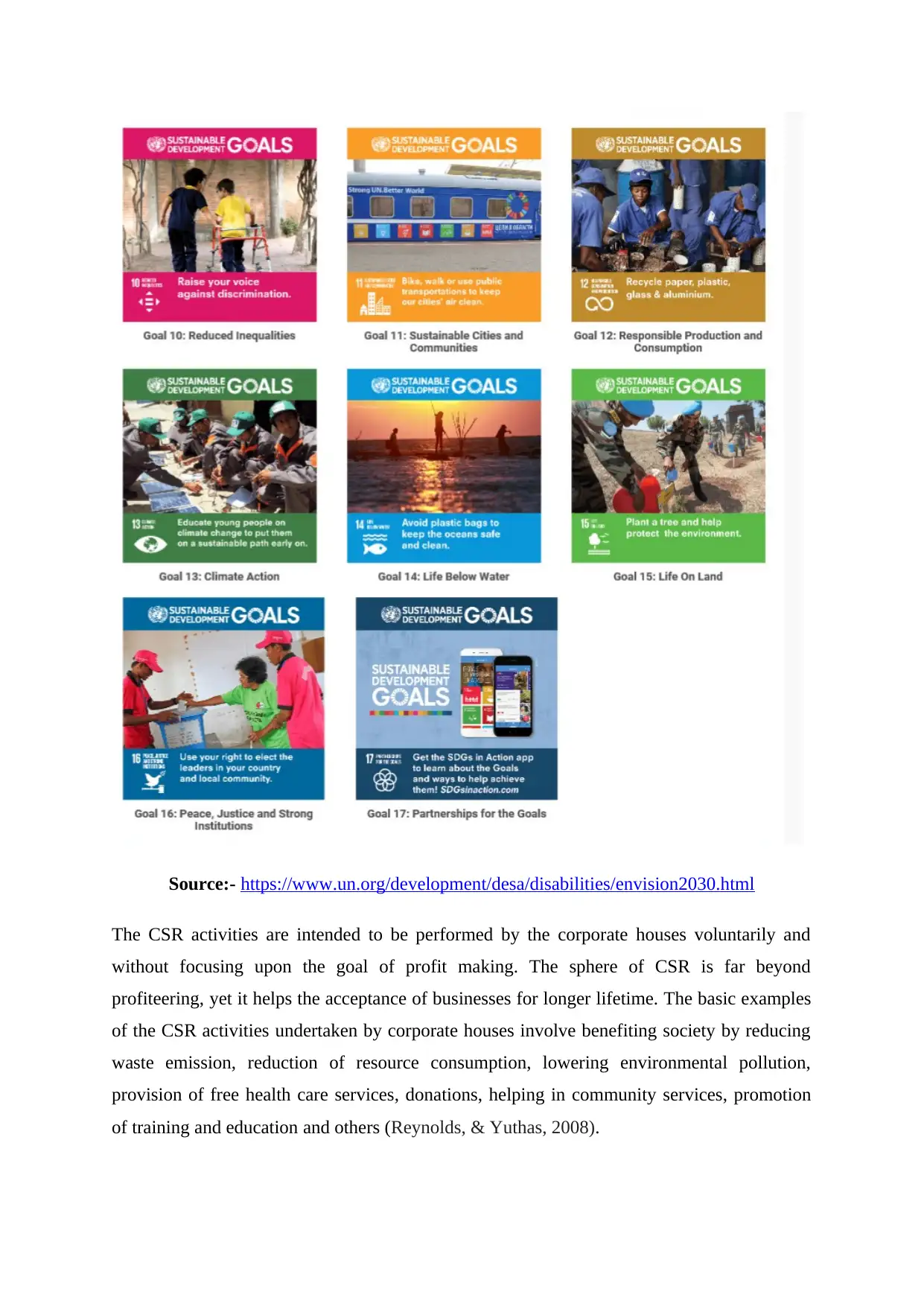
Source:- https://www.un.org/development/desa/disabilities/envision2030.html
The CSR activities are intended to be performed by the corporate houses voluntarily and
without focusing upon the goal of profit making. The sphere of CSR is far beyond
profiteering, yet it helps the acceptance of businesses for longer lifetime. The basic examples
of the CSR activities undertaken by corporate houses involve benefiting society by reducing
waste emission, reduction of resource consumption, lowering environmental pollution,
provision of free health care services, donations, helping in community services, promotion
of training and education and others (Reynolds, & Yuthas, 2008).
The CSR activities are intended to be performed by the corporate houses voluntarily and
without focusing upon the goal of profit making. The sphere of CSR is far beyond
profiteering, yet it helps the acceptance of businesses for longer lifetime. The basic examples
of the CSR activities undertaken by corporate houses involve benefiting society by reducing
waste emission, reduction of resource consumption, lowering environmental pollution,
provision of free health care services, donations, helping in community services, promotion
of training and education and others (Reynolds, & Yuthas, 2008).
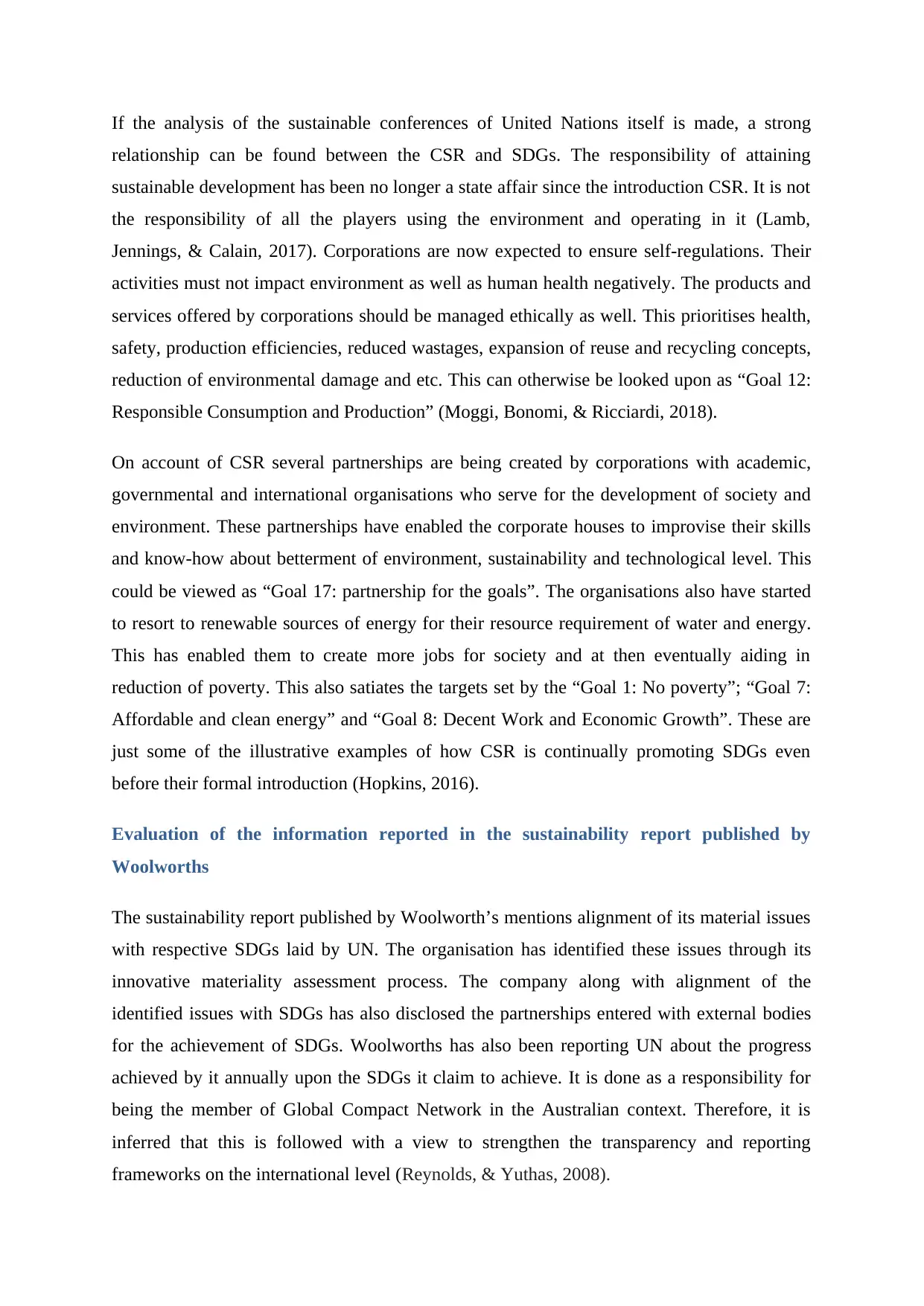
If the analysis of the sustainable conferences of United Nations itself is made, a strong
relationship can be found between the CSR and SDGs. The responsibility of attaining
sustainable development has been no longer a state affair since the introduction CSR. It is not
the responsibility of all the players using the environment and operating in it (Lamb,
Jennings, & Calain, 2017). Corporations are now expected to ensure self-regulations. Their
activities must not impact environment as well as human health negatively. The products and
services offered by corporations should be managed ethically as well. This prioritises health,
safety, production efficiencies, reduced wastages, expansion of reuse and recycling concepts,
reduction of environmental damage and etc. This can otherwise be looked upon as “Goal 12:
Responsible Consumption and Production” (Moggi, Bonomi, & Ricciardi, 2018).
On account of CSR several partnerships are being created by corporations with academic,
governmental and international organisations who serve for the development of society and
environment. These partnerships have enabled the corporate houses to improvise their skills
and know-how about betterment of environment, sustainability and technological level. This
could be viewed as “Goal 17: partnership for the goals”. The organisations also have started
to resort to renewable sources of energy for their resource requirement of water and energy.
This has enabled them to create more jobs for society and at then eventually aiding in
reduction of poverty. This also satiates the targets set by the “Goal 1: No poverty”; “Goal 7:
Affordable and clean energy” and “Goal 8: Decent Work and Economic Growth”. These are
just some of the illustrative examples of how CSR is continually promoting SDGs even
before their formal introduction (Hopkins, 2016).
Evaluation of the information reported in the sustainability report published by
Woolworths
The sustainability report published by Woolworth’s mentions alignment of its material issues
with respective SDGs laid by UN. The organisation has identified these issues through its
innovative materiality assessment process. The company along with alignment of the
identified issues with SDGs has also disclosed the partnerships entered with external bodies
for the achievement of SDGs. Woolworths has also been reporting UN about the progress
achieved by it annually upon the SDGs it claim to achieve. It is done as a responsibility for
being the member of Global Compact Network in the Australian context. Therefore, it is
inferred that this is followed with a view to strengthen the transparency and reporting
frameworks on the international level (Reynolds, & Yuthas, 2008).
relationship can be found between the CSR and SDGs. The responsibility of attaining
sustainable development has been no longer a state affair since the introduction CSR. It is not
the responsibility of all the players using the environment and operating in it (Lamb,
Jennings, & Calain, 2017). Corporations are now expected to ensure self-regulations. Their
activities must not impact environment as well as human health negatively. The products and
services offered by corporations should be managed ethically as well. This prioritises health,
safety, production efficiencies, reduced wastages, expansion of reuse and recycling concepts,
reduction of environmental damage and etc. This can otherwise be looked upon as “Goal 12:
Responsible Consumption and Production” (Moggi, Bonomi, & Ricciardi, 2018).
On account of CSR several partnerships are being created by corporations with academic,
governmental and international organisations who serve for the development of society and
environment. These partnerships have enabled the corporate houses to improvise their skills
and know-how about betterment of environment, sustainability and technological level. This
could be viewed as “Goal 17: partnership for the goals”. The organisations also have started
to resort to renewable sources of energy for their resource requirement of water and energy.
This has enabled them to create more jobs for society and at then eventually aiding in
reduction of poverty. This also satiates the targets set by the “Goal 1: No poverty”; “Goal 7:
Affordable and clean energy” and “Goal 8: Decent Work and Economic Growth”. These are
just some of the illustrative examples of how CSR is continually promoting SDGs even
before their formal introduction (Hopkins, 2016).
Evaluation of the information reported in the sustainability report published by
Woolworths
The sustainability report published by Woolworth’s mentions alignment of its material issues
with respective SDGs laid by UN. The organisation has identified these issues through its
innovative materiality assessment process. The company along with alignment of the
identified issues with SDGs has also disclosed the partnerships entered with external bodies
for the achievement of SDGs. Woolworths has also been reporting UN about the progress
achieved by it annually upon the SDGs it claim to achieve. It is done as a responsibility for
being the member of Global Compact Network in the Australian context. Therefore, it is
inferred that this is followed with a view to strengthen the transparency and reporting
frameworks on the international level (Reynolds, & Yuthas, 2008).
⊘ This is a preview!⊘
Do you want full access?
Subscribe today to unlock all pages.

Trusted by 1+ million students worldwide
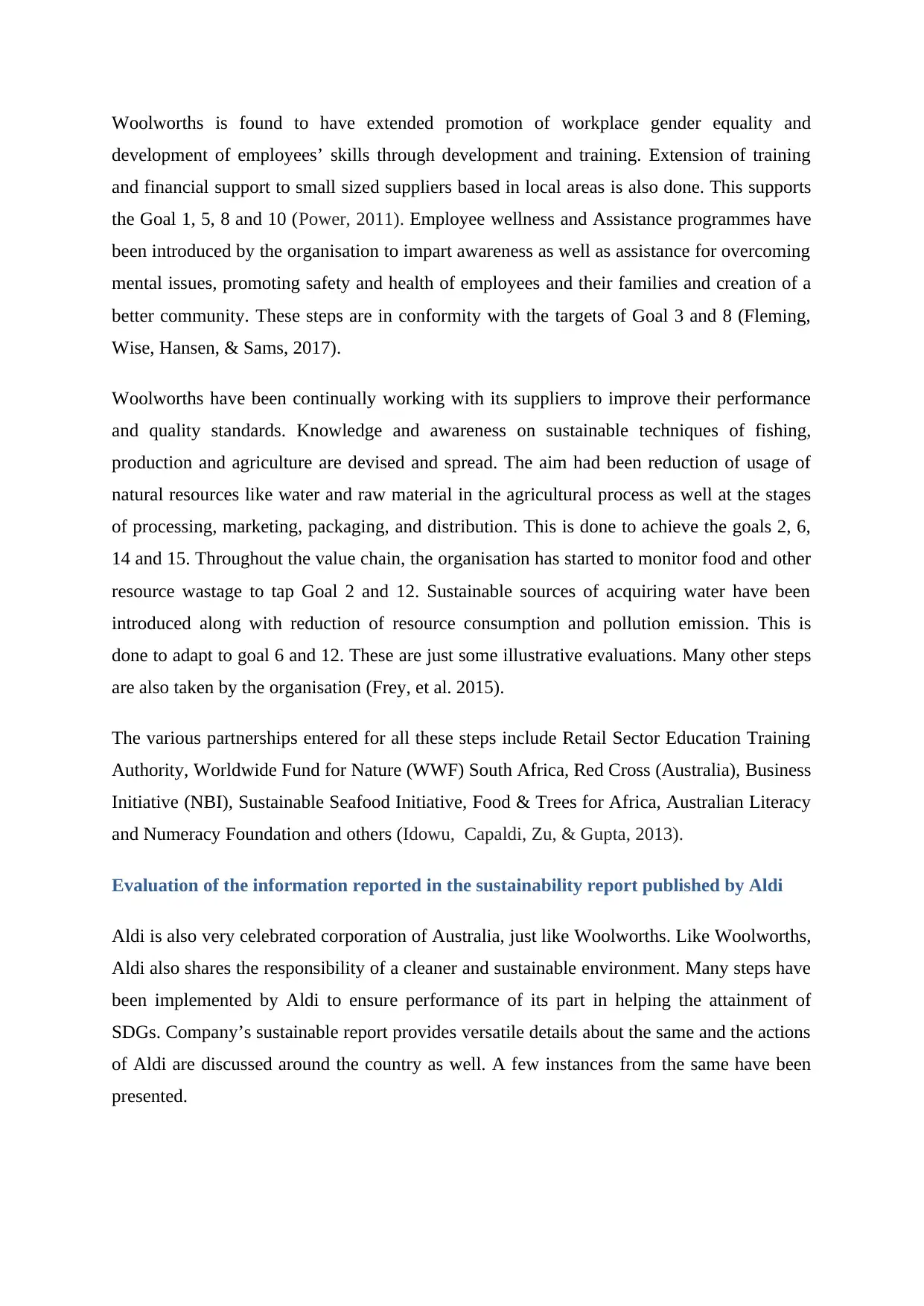
Woolworths is found to have extended promotion of workplace gender equality and
development of employees’ skills through development and training. Extension of training
and financial support to small sized suppliers based in local areas is also done. This supports
the Goal 1, 5, 8 and 10 (Power, 2011). Employee wellness and Assistance programmes have
been introduced by the organisation to impart awareness as well as assistance for overcoming
mental issues, promoting safety and health of employees and their families and creation of a
better community. These steps are in conformity with the targets of Goal 3 and 8 (Fleming,
Wise, Hansen, & Sams, 2017).
Woolworths have been continually working with its suppliers to improve their performance
and quality standards. Knowledge and awareness on sustainable techniques of fishing,
production and agriculture are devised and spread. The aim had been reduction of usage of
natural resources like water and raw material in the agricultural process as well at the stages
of processing, marketing, packaging, and distribution. This is done to achieve the goals 2, 6,
14 and 15. Throughout the value chain, the organisation has started to monitor food and other
resource wastage to tap Goal 2 and 12. Sustainable sources of acquiring water have been
introduced along with reduction of resource consumption and pollution emission. This is
done to adapt to goal 6 and 12. These are just some illustrative evaluations. Many other steps
are also taken by the organisation (Frey, et al. 2015).
The various partnerships entered for all these steps include Retail Sector Education Training
Authority, Worldwide Fund for Nature (WWF) South Africa, Red Cross (Australia), Business
Initiative (NBI), Sustainable Seafood Initiative, Food & Trees for Africa, Australian Literacy
and Numeracy Foundation and others (Idowu, Capaldi, Zu, & Gupta, 2013).
Evaluation of the information reported in the sustainability report published by Aldi
Aldi is also very celebrated corporation of Australia, just like Woolworths. Like Woolworths,
Aldi also shares the responsibility of a cleaner and sustainable environment. Many steps have
been implemented by Aldi to ensure performance of its part in helping the attainment of
SDGs. Company’s sustainable report provides versatile details about the same and the actions
of Aldi are discussed around the country as well. A few instances from the same have been
presented.
development of employees’ skills through development and training. Extension of training
and financial support to small sized suppliers based in local areas is also done. This supports
the Goal 1, 5, 8 and 10 (Power, 2011). Employee wellness and Assistance programmes have
been introduced by the organisation to impart awareness as well as assistance for overcoming
mental issues, promoting safety and health of employees and their families and creation of a
better community. These steps are in conformity with the targets of Goal 3 and 8 (Fleming,
Wise, Hansen, & Sams, 2017).
Woolworths have been continually working with its suppliers to improve their performance
and quality standards. Knowledge and awareness on sustainable techniques of fishing,
production and agriculture are devised and spread. The aim had been reduction of usage of
natural resources like water and raw material in the agricultural process as well at the stages
of processing, marketing, packaging, and distribution. This is done to achieve the goals 2, 6,
14 and 15. Throughout the value chain, the organisation has started to monitor food and other
resource wastage to tap Goal 2 and 12. Sustainable sources of acquiring water have been
introduced along with reduction of resource consumption and pollution emission. This is
done to adapt to goal 6 and 12. These are just some illustrative evaluations. Many other steps
are also taken by the organisation (Frey, et al. 2015).
The various partnerships entered for all these steps include Retail Sector Education Training
Authority, Worldwide Fund for Nature (WWF) South Africa, Red Cross (Australia), Business
Initiative (NBI), Sustainable Seafood Initiative, Food & Trees for Africa, Australian Literacy
and Numeracy Foundation and others (Idowu, Capaldi, Zu, & Gupta, 2013).
Evaluation of the information reported in the sustainability report published by Aldi
Aldi is also very celebrated corporation of Australia, just like Woolworths. Like Woolworths,
Aldi also shares the responsibility of a cleaner and sustainable environment. Many steps have
been implemented by Aldi to ensure performance of its part in helping the attainment of
SDGs. Company’s sustainable report provides versatile details about the same and the actions
of Aldi are discussed around the country as well. A few instances from the same have been
presented.
Paraphrase This Document
Need a fresh take? Get an instant paraphrase of this document with our AI Paraphraser
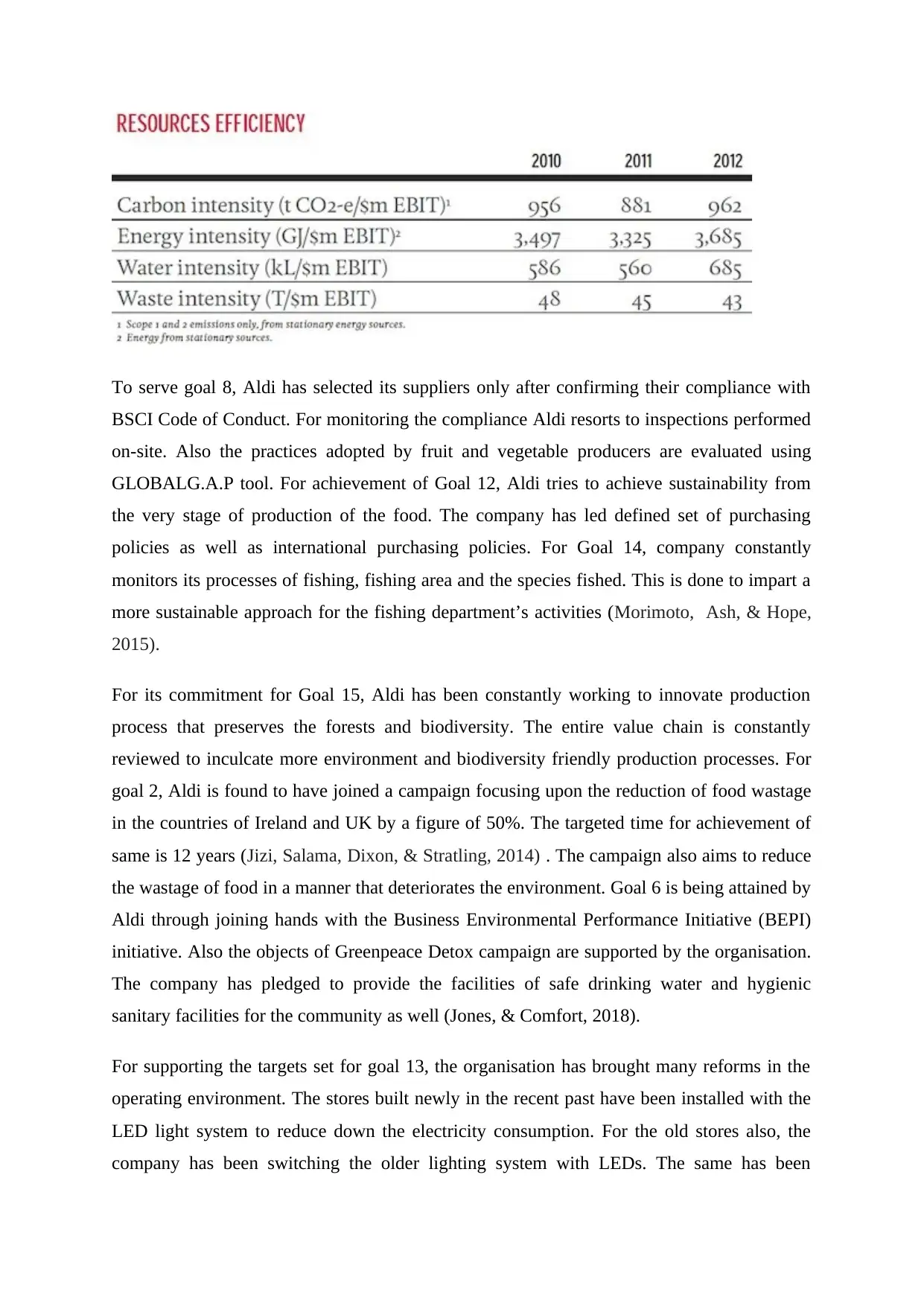
To serve goal 8, Aldi has selected its suppliers only after confirming their compliance with
BSCI Code of Conduct. For monitoring the compliance Aldi resorts to inspections performed
on-site. Also the practices adopted by fruit and vegetable producers are evaluated using
GLOBALG.A.P tool. For achievement of Goal 12, Aldi tries to achieve sustainability from
the very stage of production of the food. The company has led defined set of purchasing
policies as well as international purchasing policies. For Goal 14, company constantly
monitors its processes of fishing, fishing area and the species fished. This is done to impart a
more sustainable approach for the fishing department’s activities (Morimoto, Ash, & Hope,
2015).
For its commitment for Goal 15, Aldi has been constantly working to innovate production
process that preserves the forests and biodiversity. The entire value chain is constantly
reviewed to inculcate more environment and biodiversity friendly production processes. For
goal 2, Aldi is found to have joined a campaign focusing upon the reduction of food wastage
in the countries of Ireland and UK by a figure of 50%. The targeted time for achievement of
same is 12 years (Jizi, Salama, Dixon, & Stratling, 2014) . The campaign also aims to reduce
the wastage of food in a manner that deteriorates the environment. Goal 6 is being attained by
Aldi through joining hands with the Business Environmental Performance Initiative (BEPI)
initiative. Also the objects of Greenpeace Detox campaign are supported by the organisation.
The company has pledged to provide the facilities of safe drinking water and hygienic
sanitary facilities for the community as well (Jones, & Comfort, 2018).
For supporting the targets set for goal 13, the organisation has brought many reforms in the
operating environment. The stores built newly in the recent past have been installed with the
LED light system to reduce down the electricity consumption. For the old stores also, the
company has been switching the older lighting system with LEDs. The same has been
BSCI Code of Conduct. For monitoring the compliance Aldi resorts to inspections performed
on-site. Also the practices adopted by fruit and vegetable producers are evaluated using
GLOBALG.A.P tool. For achievement of Goal 12, Aldi tries to achieve sustainability from
the very stage of production of the food. The company has led defined set of purchasing
policies as well as international purchasing policies. For Goal 14, company constantly
monitors its processes of fishing, fishing area and the species fished. This is done to impart a
more sustainable approach for the fishing department’s activities (Morimoto, Ash, & Hope,
2015).
For its commitment for Goal 15, Aldi has been constantly working to innovate production
process that preserves the forests and biodiversity. The entire value chain is constantly
reviewed to inculcate more environment and biodiversity friendly production processes. For
goal 2, Aldi is found to have joined a campaign focusing upon the reduction of food wastage
in the countries of Ireland and UK by a figure of 50%. The targeted time for achievement of
same is 12 years (Jizi, Salama, Dixon, & Stratling, 2014) . The campaign also aims to reduce
the wastage of food in a manner that deteriorates the environment. Goal 6 is being attained by
Aldi through joining hands with the Business Environmental Performance Initiative (BEPI)
initiative. Also the objects of Greenpeace Detox campaign are supported by the organisation.
The company has pledged to provide the facilities of safe drinking water and hygienic
sanitary facilities for the community as well (Jones, & Comfort, 2018).
For supporting the targets set for goal 13, the organisation has brought many reforms in the
operating environment. The stores built newly in the recent past have been installed with the
LED light system to reduce down the electricity consumption. For the old stores also, the
company has been switching the older lighting system with LEDs. The same has been
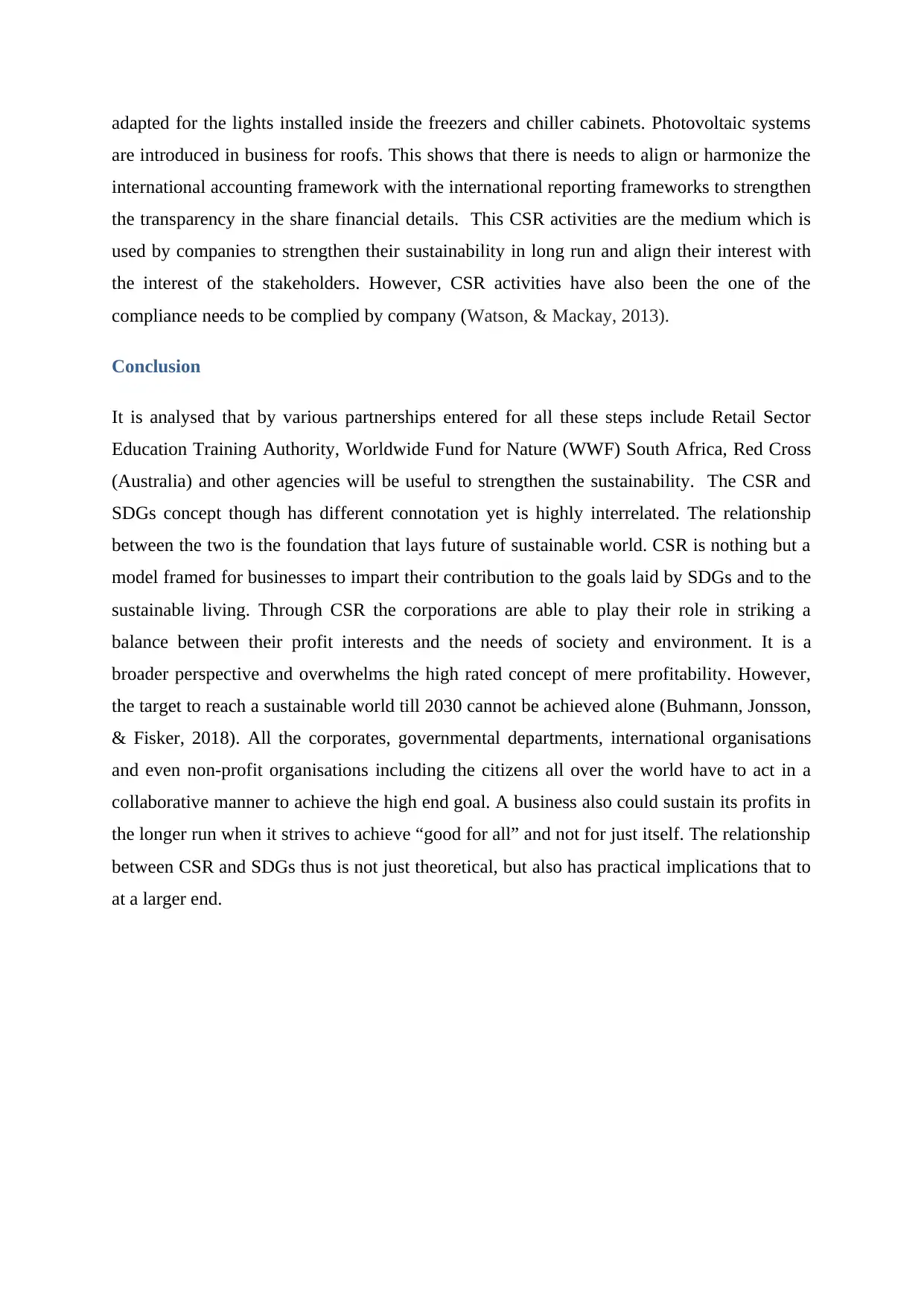
adapted for the lights installed inside the freezers and chiller cabinets. Photovoltaic systems
are introduced in business for roofs. This shows that there is needs to align or harmonize the
international accounting framework with the international reporting frameworks to strengthen
the transparency in the share financial details. This CSR activities are the medium which is
used by companies to strengthen their sustainability in long run and align their interest with
the interest of the stakeholders. However, CSR activities have also been the one of the
compliance needs to be complied by company (Watson, & Mackay, 2013).
Conclusion
It is analysed that by various partnerships entered for all these steps include Retail Sector
Education Training Authority, Worldwide Fund for Nature (WWF) South Africa, Red Cross
(Australia) and other agencies will be useful to strengthen the sustainability. The CSR and
SDGs concept though has different connotation yet is highly interrelated. The relationship
between the two is the foundation that lays future of sustainable world. CSR is nothing but a
model framed for businesses to impart their contribution to the goals laid by SDGs and to the
sustainable living. Through CSR the corporations are able to play their role in striking a
balance between their profit interests and the needs of society and environment. It is a
broader perspective and overwhelms the high rated concept of mere profitability. However,
the target to reach a sustainable world till 2030 cannot be achieved alone (Buhmann, Jonsson,
& Fisker, 2018). All the corporates, governmental departments, international organisations
and even non-profit organisations including the citizens all over the world have to act in a
collaborative manner to achieve the high end goal. A business also could sustain its profits in
the longer run when it strives to achieve “good for all” and not for just itself. The relationship
between CSR and SDGs thus is not just theoretical, but also has practical implications that to
at a larger end.
are introduced in business for roofs. This shows that there is needs to align or harmonize the
international accounting framework with the international reporting frameworks to strengthen
the transparency in the share financial details. This CSR activities are the medium which is
used by companies to strengthen their sustainability in long run and align their interest with
the interest of the stakeholders. However, CSR activities have also been the one of the
compliance needs to be complied by company (Watson, & Mackay, 2013).
Conclusion
It is analysed that by various partnerships entered for all these steps include Retail Sector
Education Training Authority, Worldwide Fund for Nature (WWF) South Africa, Red Cross
(Australia) and other agencies will be useful to strengthen the sustainability. The CSR and
SDGs concept though has different connotation yet is highly interrelated. The relationship
between the two is the foundation that lays future of sustainable world. CSR is nothing but a
model framed for businesses to impart their contribution to the goals laid by SDGs and to the
sustainable living. Through CSR the corporations are able to play their role in striking a
balance between their profit interests and the needs of society and environment. It is a
broader perspective and overwhelms the high rated concept of mere profitability. However,
the target to reach a sustainable world till 2030 cannot be achieved alone (Buhmann, Jonsson,
& Fisker, 2018). All the corporates, governmental departments, international organisations
and even non-profit organisations including the citizens all over the world have to act in a
collaborative manner to achieve the high end goal. A business also could sustain its profits in
the longer run when it strives to achieve “good for all” and not for just itself. The relationship
between CSR and SDGs thus is not just theoretical, but also has practical implications that to
at a larger end.
⊘ This is a preview!⊘
Do you want full access?
Subscribe today to unlock all pages.

Trusted by 1+ million students worldwide
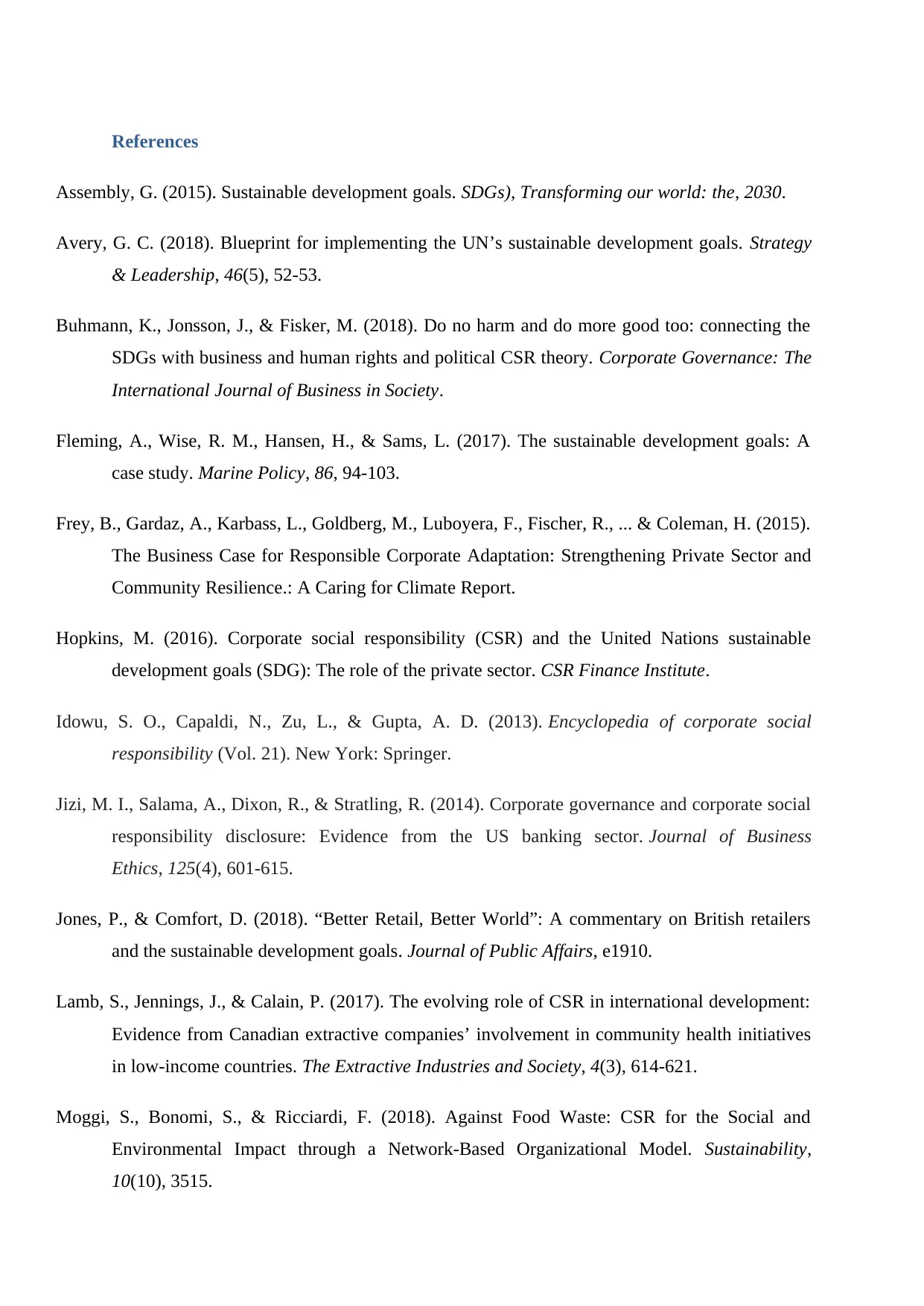
References
Assembly, G. (2015). Sustainable development goals. SDGs), Transforming our world: the, 2030.
Avery, G. C. (2018). Blueprint for implementing the UN’s sustainable development goals. Strategy
& Leadership, 46(5), 52-53.
Buhmann, K., Jonsson, J., & Fisker, M. (2018). Do no harm and do more good too: connecting the
SDGs with business and human rights and political CSR theory. Corporate Governance: The
International Journal of Business in Society.
Fleming, A., Wise, R. M., Hansen, H., & Sams, L. (2017). The sustainable development goals: A
case study. Marine Policy, 86, 94-103.
Frey, B., Gardaz, A., Karbass, L., Goldberg, M., Luboyera, F., Fischer, R., ... & Coleman, H. (2015).
The Business Case for Responsible Corporate Adaptation: Strengthening Private Sector and
Community Resilience.: A Caring for Climate Report.
Hopkins, M. (2016). Corporate social responsibility (CSR) and the United Nations sustainable
development goals (SDG): The role of the private sector. CSR Finance Institute.
Idowu, S. O., Capaldi, N., Zu, L., & Gupta, A. D. (2013). Encyclopedia of corporate social
responsibility (Vol. 21). New York: Springer.
Jizi, M. I., Salama, A., Dixon, R., & Stratling, R. (2014). Corporate governance and corporate social
responsibility disclosure: Evidence from the US banking sector. Journal of Business
Ethics, 125(4), 601-615.
Jones, P., & Comfort, D. (2018). “Better Retail, Better World”: A commentary on British retailers
and the sustainable development goals. Journal of Public Affairs, e1910.
Lamb, S., Jennings, J., & Calain, P. (2017). The evolving role of CSR in international development:
Evidence from Canadian extractive companies’ involvement in community health initiatives
in low-income countries. The Extractive Industries and Society, 4(3), 614-621.
Moggi, S., Bonomi, S., & Ricciardi, F. (2018). Against Food Waste: CSR for the Social and
Environmental Impact through a Network-Based Organizational Model. Sustainability,
10(10), 3515.
Assembly, G. (2015). Sustainable development goals. SDGs), Transforming our world: the, 2030.
Avery, G. C. (2018). Blueprint for implementing the UN’s sustainable development goals. Strategy
& Leadership, 46(5), 52-53.
Buhmann, K., Jonsson, J., & Fisker, M. (2018). Do no harm and do more good too: connecting the
SDGs with business and human rights and political CSR theory. Corporate Governance: The
International Journal of Business in Society.
Fleming, A., Wise, R. M., Hansen, H., & Sams, L. (2017). The sustainable development goals: A
case study. Marine Policy, 86, 94-103.
Frey, B., Gardaz, A., Karbass, L., Goldberg, M., Luboyera, F., Fischer, R., ... & Coleman, H. (2015).
The Business Case for Responsible Corporate Adaptation: Strengthening Private Sector and
Community Resilience.: A Caring for Climate Report.
Hopkins, M. (2016). Corporate social responsibility (CSR) and the United Nations sustainable
development goals (SDG): The role of the private sector. CSR Finance Institute.
Idowu, S. O., Capaldi, N., Zu, L., & Gupta, A. D. (2013). Encyclopedia of corporate social
responsibility (Vol. 21). New York: Springer.
Jizi, M. I., Salama, A., Dixon, R., & Stratling, R. (2014). Corporate governance and corporate social
responsibility disclosure: Evidence from the US banking sector. Journal of Business
Ethics, 125(4), 601-615.
Jones, P., & Comfort, D. (2018). “Better Retail, Better World”: A commentary on British retailers
and the sustainable development goals. Journal of Public Affairs, e1910.
Lamb, S., Jennings, J., & Calain, P. (2017). The evolving role of CSR in international development:
Evidence from Canadian extractive companies’ involvement in community health initiatives
in low-income countries. The Extractive Industries and Society, 4(3), 614-621.
Moggi, S., Bonomi, S., & Ricciardi, F. (2018). Against Food Waste: CSR for the Social and
Environmental Impact through a Network-Based Organizational Model. Sustainability,
10(10), 3515.
Paraphrase This Document
Need a fresh take? Get an instant paraphrase of this document with our AI Paraphraser
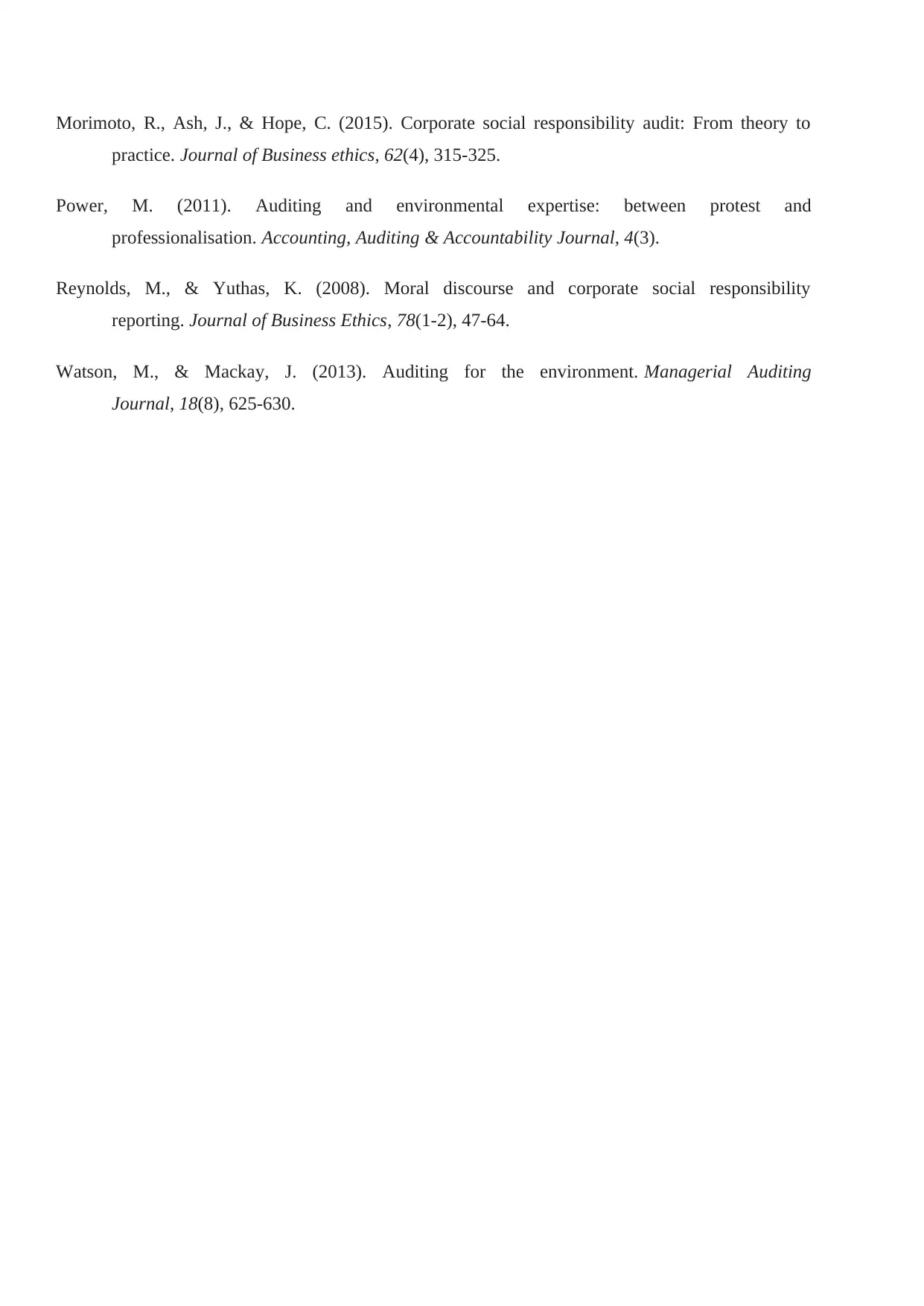
Morimoto, R., Ash, J., & Hope, C. (2015). Corporate social responsibility audit: From theory to
practice. Journal of Business ethics, 62(4), 315-325.
Power, M. (2011). Auditing and environmental expertise: between protest and
professionalisation. Accounting, Auditing & Accountability Journal, 4(3).
Reynolds, M., & Yuthas, K. (2008). Moral discourse and corporate social responsibility
reporting. Journal of Business Ethics, 78(1-2), 47-64.
Watson, M., & Mackay, J. (2013). Auditing for the environment. Managerial Auditing
Journal, 18(8), 625-630.
practice. Journal of Business ethics, 62(4), 315-325.
Power, M. (2011). Auditing and environmental expertise: between protest and
professionalisation. Accounting, Auditing & Accountability Journal, 4(3).
Reynolds, M., & Yuthas, K. (2008). Moral discourse and corporate social responsibility
reporting. Journal of Business Ethics, 78(1-2), 47-64.
Watson, M., & Mackay, J. (2013). Auditing for the environment. Managerial Auditing
Journal, 18(8), 625-630.
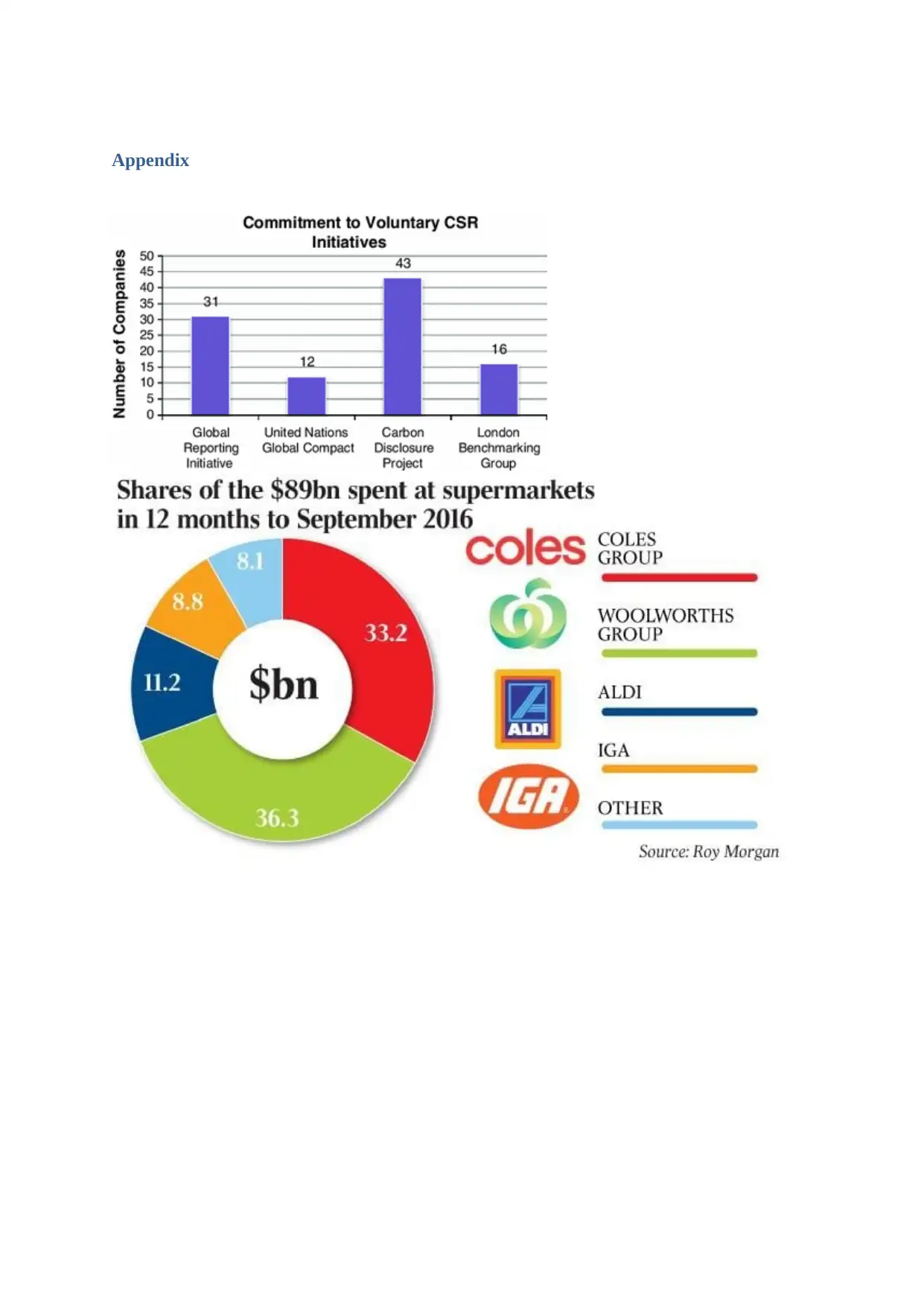
Appendix
⊘ This is a preview!⊘
Do you want full access?
Subscribe today to unlock all pages.

Trusted by 1+ million students worldwide
1 out of 13
Related Documents
Your All-in-One AI-Powered Toolkit for Academic Success.
+13062052269
info@desklib.com
Available 24*7 on WhatsApp / Email
![[object Object]](/_next/static/media/star-bottom.7253800d.svg)
Unlock your academic potential
Copyright © 2020–2026 A2Z Services. All Rights Reserved. Developed and managed by ZUCOL.





